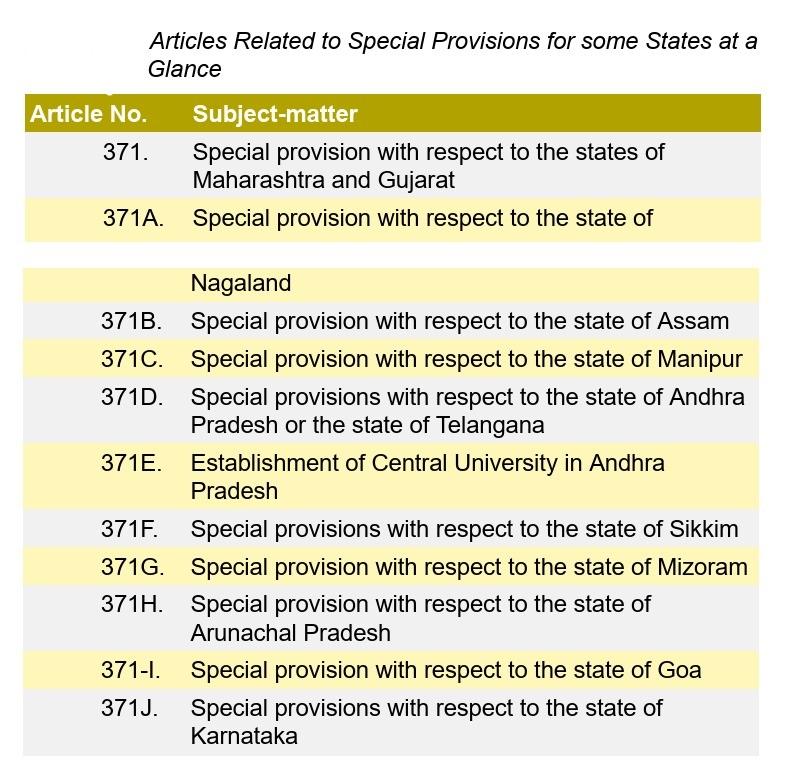Biodiversity & Environment
Article 371A and Its Impact on Coal Mining in Nagaland
- 01 Mar 2024
- 5 min read
For Prelims: Article 371A , Rat-Hole Mining, Coal
For Mains: Article 371A limitations and challenges, Sustainable mining practices, Government Policies & Interventions
Why in News?
In Nagaland, Article 371A of the Indian Constitution poses a major obstacle to regulating coal mining. This provision, upholding Naga customary law, complicates government efforts to oversee small-scale mining, especially after recent fatalities in a rat-hole mine explosion.
What is Article 371A of the Indian Constitution?
- Article 371A was introduced into the Constitution (Part XXI) as part of the 13th Amendment in 1962, granting special provisions to Nagaland (then Naga Hills and Tuensang Area).
- Article 371A states that no act of Parliament shall apply to Nagaland in respect of the religious or social practices of the Nagas, the Naga customary law and procedure, the administration of civil and criminal justice involving decisions according to the Naga customary law, and the ownership and transfer of land and its resources, unless the Nagaland Legislative Assembly decides otherwise by a resolution.
- This means that the state government has limited authority and jurisdiction over the land and its resources, which are owned and controlled by the local communities and governed by their customary laws and practices.
How is Rat-Hole Mining Regulated in Nagaland?
- Coal Mining in Nagaland:
- Nagaland possesses significant coal reserves totalling 492.68 million tonnes, but dispersed erratically and inconsistently in small pockets spread over a large area.
- The Nagaland Coal mining policy, established in 2006, permits rat-hole mining due to the scattered nature of coal deposits, making large-scale operations unfeasible.
- Rat-hole mining is a method of extracting coal from narrow horizontal tunnels or rat-holes, which are often dug by hand and are prone to accidents and environmental hazards.
- Rat-hole mining licences, known as small pocket deposit licences, are exclusively granted to individual landowners for limited durations and specific conditions.
- According to Section 6.4(ii) of the Nagaland Coal Policy (First Amendment) of 2014, these licences are restricted to mining areas not exceeding 2 hectares, with an annual coal production cap of 1,000 tonnes and a prohibition on heavy machinery usage.
- Rat-hole mining operations necessitate consent from relevant departments, including Forest and Environment, ensuring compliance with environmental regulations.
- Despite proper clearances and defined mining plans issued by the State government, instances of illegal rat-hole mining persist in Nagaland.
- The dependence of local communities on coal mining for sustenance further complicates regulatory efforts, as stringent regulations may impact livelihoods, necessitating a delicate balance between economic interests and environmental concerns.
- Article 371A and Controlling Rat-Hole Mining in Nagaland:
- This Article 371A grants Nagaland special rights over its land and resources, making it difficult for the governments to impose regulations that might be perceived as infringing on these rights.
- The Nagaland government struggles to effectively regulate small-scale mining operations, particularly those practised by individual landowners due to the limitations posed by Article 371A.
- The recent deaths in a rat-hole mine highlight the safety risks associated with unregulated mining practices. These incidents raise concerns about the lack of proper safety measures and highlight the urgency for effective regulations.
Note
- The Supreme Court and National Green Tribunal (NGT), banned rat hole mining in 2014 as it causes environmental degradation and is a threat to the life of miners. The Tribunal termed it as unscientific.
Way Forward
- Enhance monitoring and enforcement measures to crack down on illegal mining activities, including increased surveillance, inspections, and penalties for violators.
- Conduct outreach programs to educate local communities about the adverse effects of unregulated mining, emphasizing the importance of compliance with safety and environmental standards.
- Foster collaboration between government agencies, local communities, mining license holders, and environmental organizations to develop comprehensive strategies for sustainable and responsible mining practices.
Read more: Rat-Hole Mining
UPSC Civil Services Examination, Previous Year Question (PYQ)
Q. “In spite of adverse environmental impact, coal mining is still inevitable for development”. Discuss. (2017)







